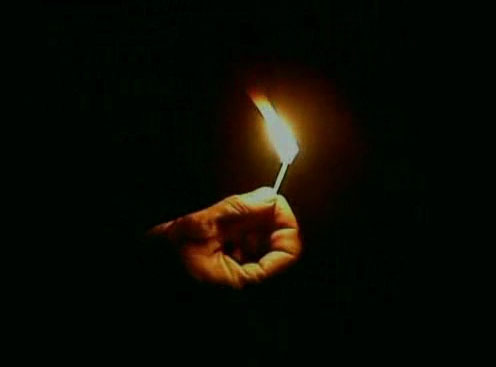
Here’s a wonderful scene from Abbas Kiarostami’s ‘ABC Africa’ (2001) – the first work he shot with DV, documenting Ugandan children orphaned by the successive disasters of civil war and AIDS – in which the image is wrapped in complete darkness. It is night, and the power has been turned off in the Ugandan city of Masaka, leaving the director and members of his small crew, who had been filming a cloud of mosquitoes, with no illumination. And for about five long minutes, we are also in the dark, listening to idle conversation (in Farsi) as the portable, battery-powered digital video camera keeps rolling. The dark spell ends with a few flashes of lightning briefly illuminating a tree waving in the wind outside the window. The scene doesn’t only call attention to the medium’s limitations (and its power) and to the artifice involved in even its simplest use, but also to the terror of the pitch black (African) night, filled with the unknown. Jonathan Rosenbaum wrote about this scene: “(Kiarostami’s) impressions come to the fore during a lengthy conversation with his assistant in the dark, and this scene evokes a sense of reality in Africa that otherwise would have been impossible to capture. … Creativity – his own joined with ours – winds up playing a role; the lighting of matches and the bursts of lightning and thunder that ultimately lead us out of the darkness are the essence of his art, flashes of illumination in the midst of total uncertainty.”
It’s worth pointing out that Alain Bergala believes this scene was staged, pointing out similar ideas in previous films. In ‘A Taste of Cherry’ (1997), there’s a moment towards the end when the main character lies in his grave at night, sporadically illuminated by ominous bursts of lightning. Adrian Martin wrote: “with its flashes of lightning in the blackout of night, with its sensurround rumbling of thunder, with its unbearably poignant mystery of whether this man will live or die, the scene takes us close to an absolute (and absolutely cinematic) experience of existential negation, more powerfully than any horror movie.”
Apparently, Kiarostami wanted to extend the intermittent darkness that he abandoned the audience in to seven minutes of unbroken black screen in ‘The Wind Will Carry Us’ (1999) but could not sustain it. What remains of this plan is the cow milking scene (the one in which the poem (by Forough Farrokhzad) is quoted that gave the film its title) in which the main character pays a visit to a young woman with the goal of buying some milk. He finds the woman in complete darkness, out of which she emerges with a gas lamp, which she holds down by her side to light the way.
In ‘ABC Africa’, Kiarostami did finally achieve his exercise in darkness.